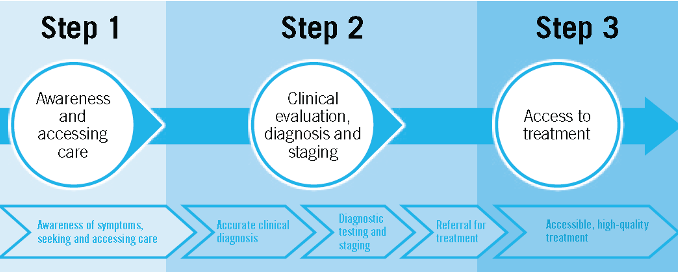
Symptoms of cancer:
- In colon cancer, the nature of stool keeps changing with unexpected weight loss.
- In breast cancer, there can be lump on node indicating the presence of tumor.
- In case of wart or mole, there is frequent change in nature of tissues.
- In case of throat cancer, there is persistent hoarseness and coughing.
- In case of cervical cancer, there is pelvic and abdominal pain with urinary problems.
Detection or diagnosis:
- On the basis of blood or biopsy
- X-ray studies
- CT-scan or MRI for internal organs, like pancreas, liver, gall bladder etc.
- By using monoclonal antibodies (called magic bullets)
- The cancer causing genes called oncogenes, remain suppressed which are present in the normal cells.
- Some argue that cancer develops due to suppression of anti-oncogenes present in normal cells.
- The cancer associated genes like genes inducing cell proliferation, genes inhibiting cell proliferation and the genes regulating programmed cell death may be altered or mutated to cause cancer.
Treatment:
- Surgery:
- It is used to cancer localized in larynx, breast, uterus etc.
- There is a high chance of the recurrence of malignancy due to the cells which are left out (not completely removed).
- The lasers can also be used for killing or surgically removing the malignant tissue.
- Radiations:
- The ϒ-radiations (gamma radiations) can be used to kill the cancerous cells.
- The disadvantage of this technique is that some of the neighboring non-cancerous cells can also be damaged.
- Chemotherapy:
- Chemicals can be used to treat the cancer if the metastasis (spread via blood) has already set in.
- The chemicals can either mimic the chemicals which prevent DNA replication, or they can prevent translation of the proteins.
- As the cell division is stopped, the growth of secondary tumor doesn’t occur.
- The cell division and proliferation of normal cell can be affected by chemotherapy with some other side effects like nausea, hair fall etc.
- Grafting or transplantation:
- In case of myeloma (the cancer of bone marrow), the marrow can be transplanted from a donor to the cancer patient.
- Use of monoclonal antibodies can be very effective in certain types of cancer treated by immunotherapy.
Prevention of cancer:
- Vitamin supplements:
- Vitamin A prevents carcinoma
- Vitamin E (an anti-oxidant) is anti-cancerous
- Vitamin C and Vitamin B17 are also anti-cancerous
- Roughage:
- Fiber-rich food stimulates peristalsis and prevents gut cancer (particularly of the colon).
- Low calorie diet:
- Reduction in calorie intake prevents the occurrence of cancer.
Cancer (Symptoms, detection, treatment and prevention)